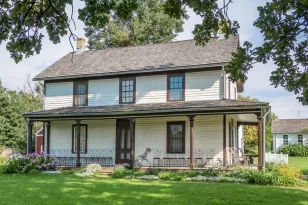 Kolshorn Lecture: Diversity (Evolution) and Connection (Ecology) in Science, and Beyond with Evolutionary Biologist Dr. JC Buckn
Kolshorn Lecture: Diversity (Evolution) and Connection (Ecology) in Science, and Beyond with Evolutionary Biologist Dr. JC Buckn
Dates
The dates for this event have passed. No future dates are available at this time.
About
Recommended ages: 14+
Each year, the Department of Fisheries, Wildlife and Conservation Biology at the University of Minnesota invites a distinguished scientist or conservationist to campus to give the Kolshorn Lecture. The Kolshorn lecture series was established in 1982 to honor Otto W. Kolshorn. Otto Kolshorn was a farmer, teacher, school board member, and Justice-of-the Peace from Goodhue County, Minnesota, who served five terms in the Minnesota House of Representatives.
This year’s lecture by Dr. JC Buckner, Diversity (Evolution) and Connection (Ecology) in Science, and Beyond, will be held in person at the Bell Museum.
Schedule
- Doors open at 5:00 pm
- Light refreshments will be served at 5:15 pm and participants will have the opportunity to visit the temporary exhibitions In Search of Earth’s Secrets and Coring the Continents.
- The lecture will begin at 6:00 pm.
This lecture is free and open to all. To participate, register on Eventbrite. This is an in-person event at the Bell Museum.
About the Speaker
Dr. JC Buckner is an evolutionary zoologist and assistant professor in the Department of Biology at the University of Texas at Arlington and a research associate at the Smithsonian National Museum of Natural History. She serves as the principal investigator of the IDER lab which studies the macroevolution of vertebrates with particular interest in biodiversity dynamics, adaptive genetics, and trait evolution.
Buckner received her BS in Zoology from SUNY Oswego where she participated in the Ronald E. McNair Postbaccalaureate Achievement Program. She earned her PhD from the Department of Ecology and Evolutionary Biology at UCLA. During that time, she completed part of her dissertation in Brazil through a Fulbright US program research award. Buckner completed her NSF Postdoctoral Research Fellowship in Biology in the Iowa State University Department of Ecology, Evolution and Organismal Biology followed by a postdoctoral research position at the LSU Museum of Natural Science.
Buckner is also devoted to creating inclusive spaces in academia to welcome curious scientists of all backgrounds to pursue their passions. In that capacity, she serves as the faculty co-advisor for the UTA SACNAS chapter, on the council for the Society of Systematic Biologists and on the board for the non-profit Black in Natural History Museums, with the hope of improving the experiences of underrepresented scientists, celebrating their contributions, and facilitating their collaborations.
The knowledge, labor, and sacrifice of Black peoples has contributed to natural history and its associated collections for centuries. Black in Natural History Museums is an organization, and a movement, that pays homage to those people, named and unnamed. The Bell Museum joins in the effort to bring the work of Black scientists, administrators, educators, and other museum staff past and present to light in October 2024. Learn more about Black in Natural History Museums and its mission to diversify natural history museums.
This free, in-person event is hosted by the Department of Fisheries, Wildlife and Conservation Biology in partnership with the Bell Museum.
What's Nearby

Costumed guides tell the story of the Gibbs family and early 1800s Dakota history because of the…

The College of Biological Sciences Conservatory and Botanical Collection is a diverse collection of…

The 520-square-foot Paul Whitney Larson Art Gallery is located on the Lower Level of the St. Paul…

Goldstein Museum of Design (GMD), part of the University of Minnesota's College of Design, advances…